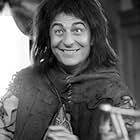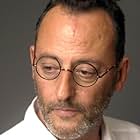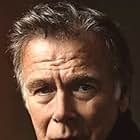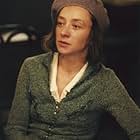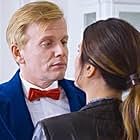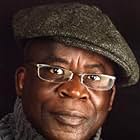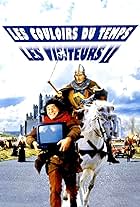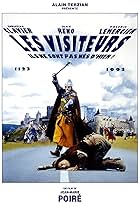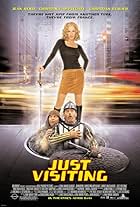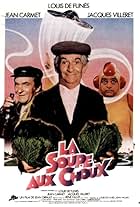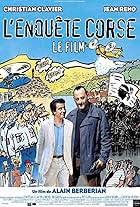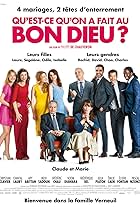IMDb RATING
4.6/10
4.9K
YOUR RATING
Knight Godefroy de Montmirail and squire Jacquouille are stranded in 1793. Using trickery to break free from their shackles, both perilously partake in the Montmirail family's run away in th... Read allKnight Godefroy de Montmirail and squire Jacquouille are stranded in 1793. Using trickery to break free from their shackles, both perilously partake in the Montmirail family's run away in the quest for an exiting time-shift.Knight Godefroy de Montmirail and squire Jacquouille are stranded in 1793. Using trickery to break free from their shackles, both perilously partake in the Montmirail family's run away in the quest for an exiting time-shift.
Eric De Staercke
- Le duc hollandais
- (as Eric de Staercke)
Storyline
Did you know
- TriviaFirst film directed by Jean-Marie Poiré since My Wife Maurice (2002), 14 years from now.
- GoofsJacques-Henri Jacquart appears to be in his 30s or 40s in the 1990s; actor Christian Clavier was 40 when the first film was shot. However, he appears as a boy aged around 10 during World War II, which means he should be around 60 at the start of the 1990s.
- ConnectionsFollows The Visitors (1993)
Featured review
In 1998, "The Visitors" saga concluded on a rather frustrating cliffhanger. Godefroy the Brave (Jean Reno) and his faithful servant Jacquouille (Christian Clavier) were, once again, misdirected in the corridors of time and left prisoners during the French Revolution. The film ended on a note that seemed to say "we don't care for continuity as long as there's a gag" (as if our beloved medieval characters in a cage would be a pleasing sight).
Still, the film met with commercial success, but apart from the American remake (which I thought was better), it seemed like the director, Jean-Marie Poiré, the actors and certainly the spectators were done with "The Visitors". Until 2015 when the first teasers of two aging and uglier-looking Godefroy and Jacquouille made it clear that "The Visitors" would finally make a trilogy, how about that?
On the positive side, I thought it was inevitable since they had to come back to their time. Besides, there was no way it could be worse than the sequel and maybe the writers' team made of Poiré and Christian Clavier had time to prepare an entertaining and funny story that wouldn't rely on cheap jokes and special effects. On the other hand, I was afraid the film would be an attempt to give a 2010's flavor to the series by inserting so many 'trendy' stars (the casting of bankable Frank Dubosc and Ary Arbittan didn't reassure me). But I didn't have time to set up my anticipations as the first negative signals started to ring: no premiere, the Press couldn't watch the film before the release, talk about self-confidence.
And then came the (vengeful?) critics: a cinematic disappointment with an overuse of poo-poo jokes, an insistence on bad smell even more incongruous in the unhygienic context of the Revolution. More constructive critics denounced the disjointed aspect of the scenario, the overdose of artificial lighting to suggest night and the wooden acting of Reno who seemed more absent than usual. But the criticism that worried me the most was that: the film had no end. Whatever it meant, it really set my worries high and my expectations low, very low.
The start was promising though with the summaries of the previous films crawling à la "Star Wars", I didn't expect to smile so early. Then we're put in the Middle-Ages, paler and more pastel tones than in the first films, Godefroy and Jacquouille make a spectacular yet confusing entrance, since they're supposed to be in 1793. Indeed, it was all a dream by one of the soldiers. Later, the King orders them to find Godefroy, otherwise, his lands will be taken and he'll have no descendants. Why did they bother with that subplot since Godefroy had a mission already? As uninspired as it was, Godefroy was supposed to come back, marry Frénégonde, give her some sacred relic and close the corridors of time to prevent the plague. No continuity isn't such a big deal, but so early, it makes you expect the worst.
But I guess, I've been so thoroughly prepared for this worst that as long as they were not shown defecating on the screen or farting on others' faces, it was okay. At the end, it wasn't too bad. Actually, I've been even pleasantly surprised that the film contained more restrained part than the sequel, moments full of verbal interactions about the Revolution, classes, human rights and other 'hip' stuff, that and a great dinner scene with Robespierre (played by a chilling Nicolas Vaude). It's true the two protagonists were left behind for a while, but at least the film remained consistent with its subtitle.
And while there were a few nice nods to the original film: Marie-Anne Chazel in the cast, Godefroy being again mistaken for a distant cousin and so forth, it is true that the film insisted upon itself when it came to the smell and fecal jokes, even lengthy conversations were on the same register, like one between between the Brave and a pompous Italian aristocrat played by Arbittan, something about the honor to wipe the Royal ass. Ten seconds is the limit to maintain such a joke, but the film gratifies us with so many references to odors or feet, that it almost spilled over the script. It came to a point I was breathing heavily when Jacquouille had to serve a chocolate pie to Marat.
But on a more positive side, I liked the way this film connected with the first where 'Revolution' was a preeminent theme, one that even inspired Jacquouille to stay. It also showed his descendant, one of Robespierre's under-bosses, taking his former masters' land, thus starting his family's fortune. Even Dubosc, more restrained than usual, shone as Gonzague de Montmirail, referenced many times in the first. The others Montmirails were not foils for Clavier's antics, and happened to be so interesting that we didn't need Godefroy and Jacquouille on screen. Indeed, they provided great insights about the revolution from their own standpoint. They're the refugees and citizens, from the people, are eager to denounce them for money.
When you know the historical weight of 'denunciation' in France, the film doesn't quite honor the Revolution. And who knows maybe this revisionism appaled the oh-so republican press, who branded the film as reactionary. But it was gutsy to have such a taboo-breaking approach, it just get diluted in too many jokes and twists that the film inevitably failed to deliver its premise. Worse, it indeed didn't have time to end, and what could have been a terrific redeemer made it worse. Even as a joke, the ending could have worked, but the film suffers from the eternal syndrome of French comedy: rushed ending.
The ending (or lack of) wasn't without a meaning, and a strong one, but I wish they had time to rework the film, a few scenes cut, a few adds, it could have been something.
Still, the film met with commercial success, but apart from the American remake (which I thought was better), it seemed like the director, Jean-Marie Poiré, the actors and certainly the spectators were done with "The Visitors". Until 2015 when the first teasers of two aging and uglier-looking Godefroy and Jacquouille made it clear that "The Visitors" would finally make a trilogy, how about that?
On the positive side, I thought it was inevitable since they had to come back to their time. Besides, there was no way it could be worse than the sequel and maybe the writers' team made of Poiré and Christian Clavier had time to prepare an entertaining and funny story that wouldn't rely on cheap jokes and special effects. On the other hand, I was afraid the film would be an attempt to give a 2010's flavor to the series by inserting so many 'trendy' stars (the casting of bankable Frank Dubosc and Ary Arbittan didn't reassure me). But I didn't have time to set up my anticipations as the first negative signals started to ring: no premiere, the Press couldn't watch the film before the release, talk about self-confidence.
And then came the (vengeful?) critics: a cinematic disappointment with an overuse of poo-poo jokes, an insistence on bad smell even more incongruous in the unhygienic context of the Revolution. More constructive critics denounced the disjointed aspect of the scenario, the overdose of artificial lighting to suggest night and the wooden acting of Reno who seemed more absent than usual. But the criticism that worried me the most was that: the film had no end. Whatever it meant, it really set my worries high and my expectations low, very low.
The start was promising though with the summaries of the previous films crawling à la "Star Wars", I didn't expect to smile so early. Then we're put in the Middle-Ages, paler and more pastel tones than in the first films, Godefroy and Jacquouille make a spectacular yet confusing entrance, since they're supposed to be in 1793. Indeed, it was all a dream by one of the soldiers. Later, the King orders them to find Godefroy, otherwise, his lands will be taken and he'll have no descendants. Why did they bother with that subplot since Godefroy had a mission already? As uninspired as it was, Godefroy was supposed to come back, marry Frénégonde, give her some sacred relic and close the corridors of time to prevent the plague. No continuity isn't such a big deal, but so early, it makes you expect the worst.
But I guess, I've been so thoroughly prepared for this worst that as long as they were not shown defecating on the screen or farting on others' faces, it was okay. At the end, it wasn't too bad. Actually, I've been even pleasantly surprised that the film contained more restrained part than the sequel, moments full of verbal interactions about the Revolution, classes, human rights and other 'hip' stuff, that and a great dinner scene with Robespierre (played by a chilling Nicolas Vaude). It's true the two protagonists were left behind for a while, but at least the film remained consistent with its subtitle.
And while there were a few nice nods to the original film: Marie-Anne Chazel in the cast, Godefroy being again mistaken for a distant cousin and so forth, it is true that the film insisted upon itself when it came to the smell and fecal jokes, even lengthy conversations were on the same register, like one between between the Brave and a pompous Italian aristocrat played by Arbittan, something about the honor to wipe the Royal ass. Ten seconds is the limit to maintain such a joke, but the film gratifies us with so many references to odors or feet, that it almost spilled over the script. It came to a point I was breathing heavily when Jacquouille had to serve a chocolate pie to Marat.
But on a more positive side, I liked the way this film connected with the first where 'Revolution' was a preeminent theme, one that even inspired Jacquouille to stay. It also showed his descendant, one of Robespierre's under-bosses, taking his former masters' land, thus starting his family's fortune. Even Dubosc, more restrained than usual, shone as Gonzague de Montmirail, referenced many times in the first. The others Montmirails were not foils for Clavier's antics, and happened to be so interesting that we didn't need Godefroy and Jacquouille on screen. Indeed, they provided great insights about the revolution from their own standpoint. They're the refugees and citizens, from the people, are eager to denounce them for money.
When you know the historical weight of 'denunciation' in France, the film doesn't quite honor the Revolution. And who knows maybe this revisionism appaled the oh-so republican press, who branded the film as reactionary. But it was gutsy to have such a taboo-breaking approach, it just get diluted in too many jokes and twists that the film inevitably failed to deliver its premise. Worse, it indeed didn't have time to end, and what could have been a terrific redeemer made it worse. Even as a joke, the ending could have worked, but the film suffers from the eternal syndrome of French comedy: rushed ending.
The ending (or lack of) wasn't without a meaning, and a strong one, but I wish they had time to rework the film, a few scenes cut, a few adds, it could have been something.
- ElMaruecan82
- Apr 18, 2016
- Permalink
- How long is The Visitors: Bastille Day?Powered by Alexa
Details
- Release date
- Countries of origin
- Official sites
- Languages
- Also known as
- Прибульці 3
- Filming locations
- Production companies
- See more company credits at IMDbPro
Box office
- Budget
- €24,754,646 (estimated)
- Gross worldwide
- $18,552,314
- Runtime1 hour 50 minutes
- Color
- Aspect ratio
- 2.35 : 1
Contribute to this page
Suggest an edit or add missing content

Top Gap
By what name was The Visitors: Bastille Day (2016) officially released in India in English?
Answer







